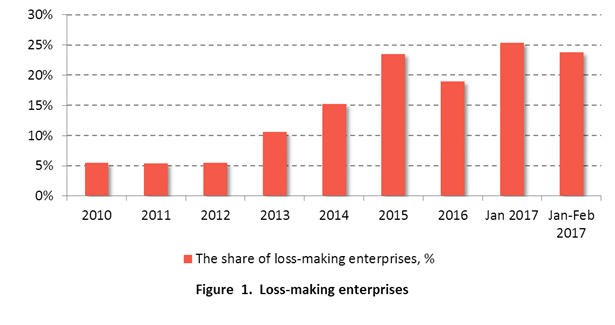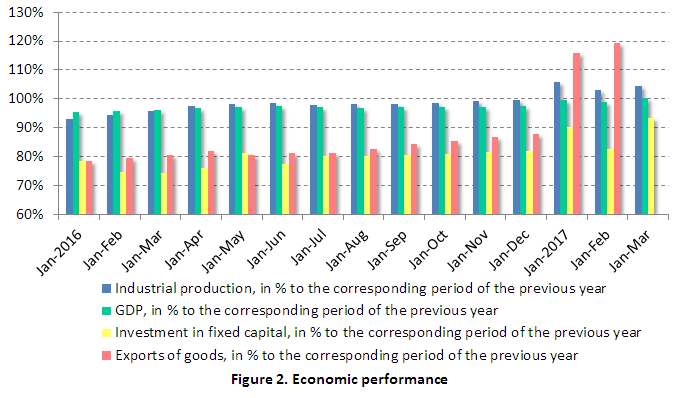Religious freedom in Belarus: worse than in Ukraine, better than in Russia

Lukashenka and Metropolitan Pavel. Photo: naviny.by
Last month, the Pew Research Centre released its Global Restrictions on Religion report, which gauges barriers imposed by governments as well as social hostilities towards religious organisations. Out of the nearly 200 countries studied, Belarus ranked among the 'high-risk' group when it comes to religious restrictions.
In a regional context, Belarus fared worse than neighbouring Poland, Ukraine, and the Baltic States, but better than in Russia. Rather surprisingly, Belarus scored relatively well with regards to the level of social hostility towards religious groups.
As another social survey demonstrated, all major Christian churches in Belarus enjoy a relatively high level of social trust. The Belarusian Orthodox Church, however, given its privileged position vis-a-vis state authorities, is more influential than others. Nevertheless, despite the significantly lower human and financial resources of other Christian confessions, Belarusians did show some trust towards them as well.
Government restrictions
In its 'Global Restrictions on Religion' report, the Pew Research Centre, a Washington-based non-partisan fact tank, measures the level of government restrictions and social hostility towards religions in nearly 200 countries. Overall, religious restrictions imposed by the Belarusian government were less severe than in Russia, which was ranked as a 'very high-risk' country. Belarus's neighbours, such as Ukraine and Poland, scored 'moderate', while the level of restrictions in Lithuania ranked 'low'.
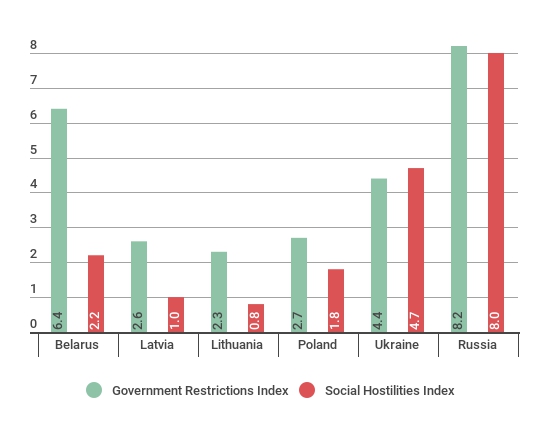
Likewise, in last year's report, Belarus received a 'high-risk' score for barriers imposed by local and national government to religious organisations. The report alluded to cases of coercive and forceful impediments to various organisations' activity, including physical abuse and government favouritism of particular religious groups.
The Pew Report, however, did not provide any specific examples of such cases in Belarus. The 'Religious Freedom Report', commissioned by the US State Department, is more detailed in this regard.
Religious freedom and equality – only for the chosen?
The 'Religious Freedom Report' portrays Belarus as a country which limits the right to practise religion, especially targeting minority organisations. For example, the government selectively denies registration to groups such as the Jehovah's Witnesses or Hare Krishna. Although one Buddhist community did manage to obtain registration in Minsk in 2015, this is an exception which proves the rule.
What's more, many communities are reluctant to report abuses out of fear of intimidation or retribution, as the report makes clear.
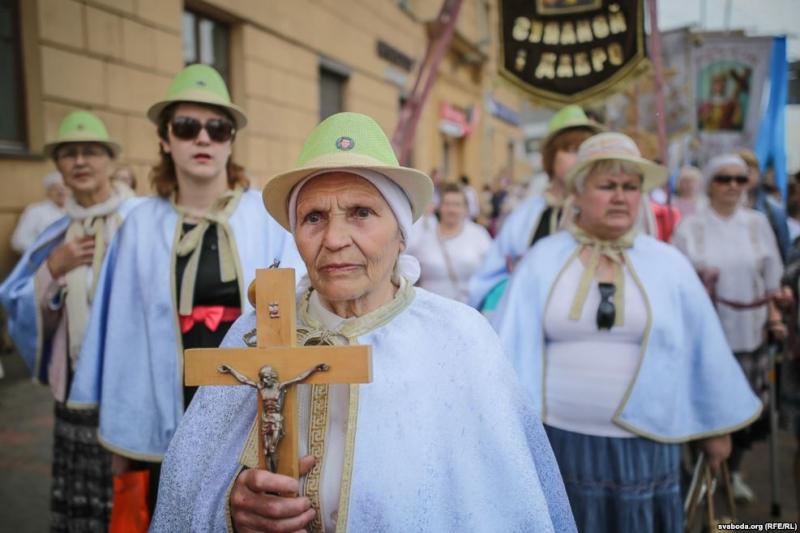 Among Christian groups, Protestant congregations seem to struggle the most to exist in Belarus. This is illustrated by the case of the New Life Church, which uses a cow barn for its gatherings and services. Minsk authorities wanted to deprive the community of a place of worship.
Among Christian groups, Protestant congregations seem to struggle the most to exist in Belarus. This is illustrated by the case of the New Life Church, which uses a cow barn for its gatherings and services. Minsk authorities wanted to deprive the community of a place of worship.
One common problem for religious minorities in Belarus has been renting or purchasing a place of worship. Formal registration remains a huge barrier. Without it, Belarusian law precludes any type of religious activity. In order to register a religious community, applicants must compile a list of full names and addresses of all members of its congregation; this discourages some communities from registering.
Proselytising, as well as promotion of religious beliefs and activities, is not always possible for all churches in Belarus. In order to conduct missionary activities, religious groups must obtain special permission from the authorities. However, the Belarusian Orthodox Church is exempt from such restrictions; they are also able to easily collect donations on public premises. In the past, some religious groups have reported incidents of harassment from the authorities when they tried to raise money for charity at other locations.
Protestant communities as civil-society actors
Protestants in Belarus, and in the post-Soviet space in general, have been increasing in number since the fall of communism. According to the 2015 'Religious Freedom Report', out of 3,315 registered religious communities in Belarus, 1,643 are Orthodox Christian, 491 are Catholic, and 1,057 are Protestant. Considering the human and financial resources the Belarusian Orthodox Church enjoys, as well as its privileged position in society, the growing popularity of Protestantism may indeed seem surprising.
The nature of many Protestant communities is especially outstanding considering the nature of Belarusian and post-communist society in general. Protestants often form intimate and vibrant communities and foster safe spaces for social interaction. Besides their religious activity, some congregations help alcoholics, offer English language classes, and provide religious education for children. Perhaps most importantly, people often meet and spend quality time together as a community after worship.
Religion and Belarusian society
Interestingly, the grim picture painted by various reports is slightly improved when social hostility is taken into account. Social hostility here implies intimidation and violence on behalf of society. In the Pew report, Belarus, along with Poland, scored 'moderate', while Ukraine ('high') and Russia ('very high') lagged behind.
This result could mean two things. First, it is possible that Belarusian society is relatively open and tolerant, or at least less intrusive when it comes to religious matters. Second, the rather hostile attitude of the authorities towards various religions, and religious minorities in particular, is not necessarily reflected in popular sentiment.
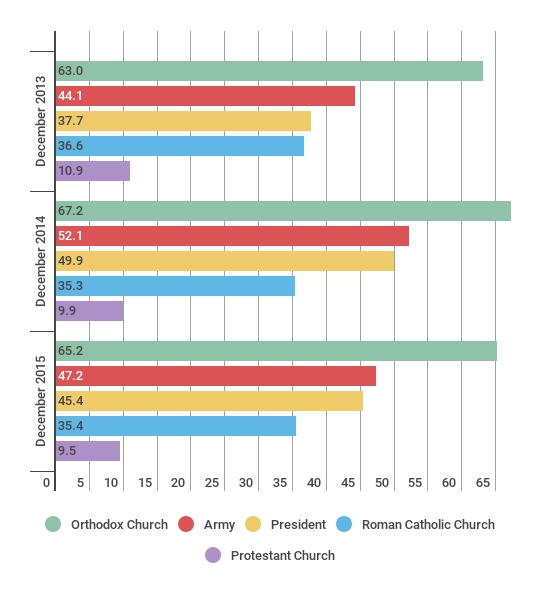 In fact, as social surveys demonstrate, some Belarusians trust Protestant minorities. According to findings from a survey published by NISEPI in 2015, 65.2% of Belarusians trust the Orthodox Church. This is slightly less than in 2014 (67.2%), 35.3% of people trust the Catholic Church, whereas 9.5% of respondents trust the 'Protestant Church'.
In fact, as social surveys demonstrate, some Belarusians trust Protestant minorities. According to findings from a survey published by NISEPI in 2015, 65.2% of Belarusians trust the Orthodox Church. This is slightly less than in 2014 (67.2%), 35.3% of people trust the Catholic Church, whereas 9.5% of respondents trust the 'Protestant Church'.
The authorities perfectly understand this phenomenon, and they strike while the iron is hot. Hence, the Ministry of Education signed a special agreement with the Orthodox Church in November 2015 stipulating that the Orthodox Church would get more involved in celebrations of the Great Patriotic War, one of the cornerstones of the state-driven historical narrative in today's Belarus. In fact, they even involved the Orthodox Church in promoting certain models of patriotism and citizenship. No similar arrangements have been made with other confessions.
True religious freedom in Belarus – near impossible?
The present politics of the state vis-a-vis religious organisations is full of contradictions.
On one hand, the authorities boast about the historically multi-confessional character of Belarusian society. On the other hand, although they have drawn up an official list of the five traditional and historical faiths in the country, they conveniently overlook Calvinists and Old Believers.
Alexander Lukashenka, the president of Belarus, readily attends certain ecumenical services and later poses for pictures together with the heads of the major Christian churches. Nevertheless, the authorities pursue a selective policy towards different Christian churches, and the registration procedure for religious organisations remains complicated. Despite restrictions, however, in 2015 the authorities allowed a gathering of several hundred mainly Evangelical Christians at the Čyžouka Arena in Minsk for collective prayers.
Although the Belarusian constitution guarantees the basic right to equality for religious organisations, the situation on the ground is highly problematic. Liberalisation and more religious diversity could benefit society as a whole. It would be interesting to see how different churches would compete for members in a religiously diverse (and equal) market.




